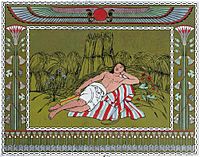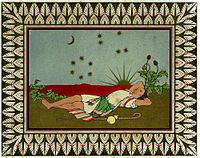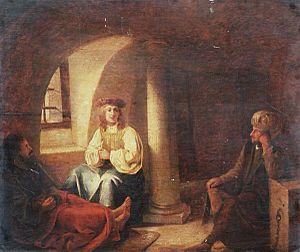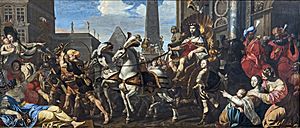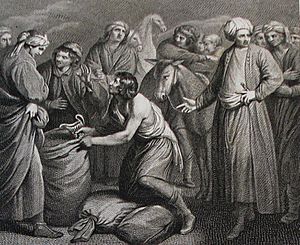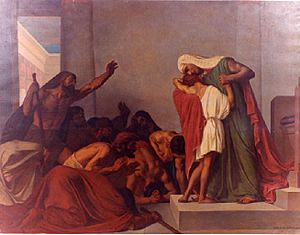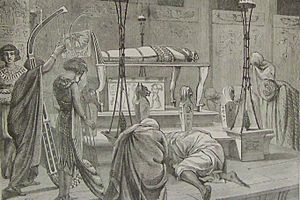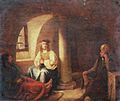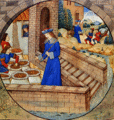Joseph (Genesis) facts for kids
Quick facts for kids
Joseph
|
|
|---|---|
| יוֹסֵף | |
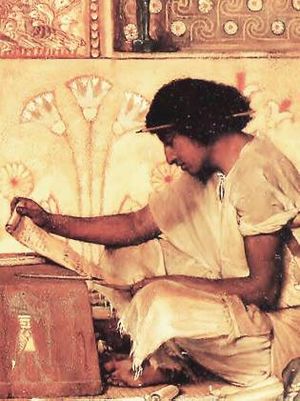
Joseph Overseer of the Pharaoh's Granaries (1874) by Sir Lawrence Alma-Tadema
|
|
| Born | 2170 AM (c. 1590 BC) |
| Died | |
| Resting place | Joseph's Tomb, Nablus, Palestine |
| Other names | Zaphnath-Paaneah (צָפְנַת פַּעְנֵחַ) |
| Spouse(s) | Asenath |
| Children |
|
| Parents | |
| Relatives |
|
Joseph is an important figure in the Book of Genesis in the Bible. He was the first of two sons born to Jacob and Rachel. Joseph was Jacob's eleventh son and the founder of the Tribe of Joseph. His story helps explain how the Israelites came to live in Egypt.
Joseph was his father Jacob's favorite son. His jealous brothers sold him into slavery in Egypt. There, he ended up in prison. However, Joseph was able to interpret the dreams of the Pharaoh, the ruler of Egypt. Because of this, he became the second-in-command in Egypt. He then saved Egypt during a terrible famine. Jacob's family traveled to Egypt to escape the famine. Joseph arranged for them to settle in the Land of Goshen, a fertile area in Egypt.
Contents
Joseph's Early Life and Family
Joseph was the son of Jacob and Rachel. He lived in the land of Canaan with his ten half-brothers, one full brother, and at least one half-sister. Joseph was Rachel's first child and Jacob's eleventh son. Jacob loved Joseph more than his other sons. He gave Joseph a special "coat of many colors".
When Joseph was seventeen, he told his brothers about two dreams he had. In the first dream, Joseph's bundle of grain stood upright. His brothers' bundles bowed down to his. In the second dream, the sun (his father), the moon (his mother), and eleven stars (his brothers) bowed to Joseph. These dreams made his brothers very angry. They believed Joseph was saying he would rule over them. This made them want to harm him (Genesis 37:1-11).
The Plot Against Joseph
Joseph's half-brothers were very jealous of him. In a place called Dothan, most of them planned to kill him (Genesis 37:18-20). However, Reuben, one of his brothers, suggested throwing Joseph into an empty cistern instead. Reuben secretly planned to rescue Joseph later. The other brothers agreed to this.
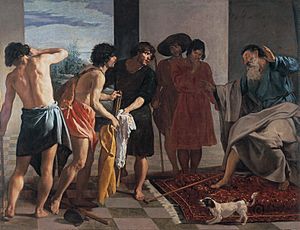
While Joseph was in the pit, the brothers saw a group of merchants. These merchants were traveling to Egypt with spices and perfumes. The brothers then sold Joseph to these merchants. After this, the brothers put goat's blood on Joseph's special coat. They showed it to Jacob, their father. Jacob believed that a wild animal had killed Joseph (Genesis 37:12-35).
Joseph in Potiphar's House
Joseph was eventually sold to Potiphar. Potiphar was the captain of Pharaoh's guard in Egypt (Genesis 37:36, Genesis 39:1). Joseph became Potiphar's personal servant. He later became the manager of Potiphar's entire household.
Potiphar's wife, sometimes called Zuleika, tried to get Joseph's attention. Joseph refused her advances. Angry that he ran away from her, she falsely accused him of attacking her. This led to Joseph being put in prison.
Joseph in Prison
The prison warden put Joseph in charge of the other prisoners. Soon after, Pharaoh's chief cup-bearer and chief baker were also put in prison. They had upset the Pharaoh. Both men had dreams, and Joseph could interpret dreams. He asked them to tell him their dreams.
The cup-bearer's dream was about a vine with three branches that grew blossoms and then grapes. The cup-bearer squeezed the grapes into Pharaoh's cup and gave it to him. Joseph said this dream meant the cup-bearer would get his job back in three days. The baker's dream was about three baskets full of bread for the Pharaoh. Birds were eating the bread from the baskets. Joseph said this dream meant the baker would be executed in three days.
Joseph asked the cup-bearer to remember him to Pharaoh once he was free. He hoped this would help him get out of prison. However, the cup-bearer forgot about Joseph after he was released.
Joseph Interprets Pharaoh's Dreams
Two more years passed. Then, the Pharaoh had two strange dreams. In the first dream, seven thin cows ate seven fat cows. In the second dream, seven withered ears of grain ate seven fat ears of grain. Pharaoh's advisors could not understand these dreams.
The cup-bearer then remembered Joseph. Joseph was brought from prison to Pharaoh. He told Pharaoh that the dreams meant seven years of plenty would come first. After that, there would be seven years of terrible famine. Joseph advised Pharaoh to store extra grain during the good years. This would save Egypt during the famine.
Joseph Becomes Vizier of Egypt
Pharaoh was very impressed with Joseph's wisdom. He made Joseph the Vizier, or second-in-command, of all Egypt. Joseph was given the name Zaphnath-Paaneah. He also married Asenath, the daughter of a priest named Potipherah.
During the seven years of plenty, Joseph made sure that food was stored in large storehouses. He carefully weighed all the produce. In the sixth year, Joseph and Asenath had two sons: Manasseh and Ephraim.
When the famine began, it was very severe. People from other countries came to Egypt to buy food. They were sent directly to Joseph, or even by Pharaoh himself (Genesis 41:37-57). Joseph set up a system where people sold their land and even themselves to the Pharaoh for food. In return, they would give one-fifth of their harvest to Pharaoh each year. This rule lasted for a long time (Genesis 47:20-31).
Joseph and His Brothers
Brothers Come to Egypt
In the second year of the famine, Joseph's half-brothers came to Egypt to buy food. They stood before the Vizier, but they did not recognize him as their brother Joseph. Joseph was now in his late 30s. Joseph, however, recognized them. He did not speak to them in their native Hebrew.
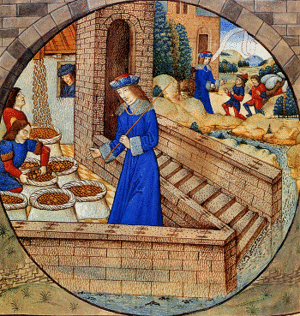
Joseph questioned them and accused them of being spies. When they mentioned a younger brother at home, Joseph demanded that this brother be brought to Egypt. This was Joseph's full brother, Benjamin. Joseph put his brothers in prison for three days. On the third day, he let them out. He repeated that he wanted their youngest brother brought to Egypt to prove they were honest.
The brothers talked among themselves in Hebrew, feeling guilty about what they had done to Joseph. Joseph understood them and had to leave the room because he was so emotional. When he returned, he took Simeon and held him hostage. He then had the other brothers' donkeys loaded with grain. He secretly put their money back into their sacks. The brothers then returned to Canaan (Genesis 42:1-28).
The Silver Cup
The brothers returned to their father, Jacob, in Canaan. They told him everything that had happened in Egypt. They were shocked to find their money still in their sacks. They also told Jacob that the Vizier demanded Benjamin be brought to Egypt. Jacob was very upset. He felt he had lost Joseph, then Simeon, and now might lose Benjamin too.
After they ran out of grain, Jacob told his sons to go back to Egypt for more. After much convincing from Reuben and Judah, Jacob finally allowed Benjamin to go with them. They feared what the Egyptians might do if they did not bring Benjamin (Genesis 42:29-43:15).
When they arrived back in Egypt, Joseph's house manager welcomed them. The brothers were worried about the money they had found in their sacks. They thought they might be accused of stealing. They immediately told the manager what happened. The manager calmed their fears and brought out Simeon. He then brought the brothers into Joseph's house and treated them well.
When Joseph appeared, they gave him gifts from their father. Joseph saw Benjamin and was overcome with emotion. He went to his private room and wept. When he had control of himself, he returned and ordered a meal. Egyptians did not eat with Hebrews, so the sons of Israel ate at a separate table (Genesis 43:16-44:34).
That night, Joseph told his manager to fill the brothers' donkeys with food and all their money. He also secretly told the manager to put his own silver cup in Benjamin's sack. The next morning, the brothers started their journey back to Canaan. Joseph sent his manager after them to question them about the "missing" silver cup.
The manager caught up with them and searched their sacks. He found the cup in Benjamin's sack, just as Joseph had planned. The brothers were very upset. They agreed to return to Egypt. When Joseph confronted them, he demanded that the one with the cup become his slave. Judah pleaded with Joseph. He asked that Benjamin be allowed to return to his father. Judah offered to stay as a slave in Benjamin's place (Genesis 44).
Family Reunited
Judah's plea moved Joseph deeply. He could no longer control his emotions. He sent all the Egyptian men out of the house. Then, he revealed to his brothers that he was Joseph. He wept so loudly that the Egyptians outside could hear him. His brothers were stunned and could not speak.
Joseph brought them closer. He told them not to be afraid. He said that what they had meant for evil, God had meant for good, to save many lives. He told them to go and bring their father and their whole family to Egypt. They would live in the province of Goshen, because five more years of famine remained. Joseph gave them Egyptian wagons, new clothes, silver money, and twenty extra donkeys loaded with supplies for their journey (Genesis 45:1-28).
So, Jacob (also called Israel) and his family, about seventy people in total, gathered their livestock and began their journey to Egypt. As they neared Egypt, Judah went ahead to ask Joseph where they should settle. They were directed to Goshen. Joseph prepared his chariot to meet his father there. It had been over twenty years since Joseph had last seen his father. When they met, they hugged and wept together for a long time. Jacob said, "Now let me die, since I have seen your face, because you are still alive" (Genesis 46:1-34).
Afterward, Joseph's family met the Pharaoh of Egypt. The Pharaoh welcomed them. He even suggested that if there were skilled men among them, they could oversee Egyptian livestock. Because Pharaoh respected Joseph so much, he honored Joseph's father. Jacob was able to bless the Pharaoh. The family then settled in Goshen (Genesis 47:1-47:12).
Jacob's Blessing and Death
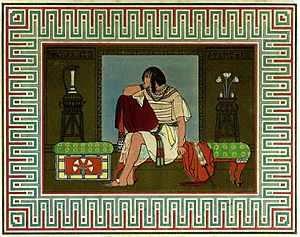
The family of Israel grew very large and gained many possessions over seventeen years, even during the famine. At this time, Joseph's father, Jacob, was 147 years old and very ill. He had lost most of his vision. Joseph was called to his father's house. Jacob pleaded with Joseph not to be buried in Egypt. Instead, he asked to be carried to Canaan and buried with his ancestors. Joseph promised to do as his father asked (Genesis 47:27–31).
Later, Joseph visited his father with his two sons, Ephraim and Manasseh. Jacob declared that they would inherit from the house of Israel as if they were his own children, just like Reuben and Simeon. Jacob then placed his left hand on the head of the elder, Manasseh, and his right hand on the head of the younger, Ephraim, and blessed Joseph. Joseph was unhappy that his father's right hand was not on his firstborn's head, so he tried to switch his father's hands. But Jacob refused, saying, "but truly his younger brother shall be greater than he." This was similar to how Jacob himself was greater than his older brother Esau. Jacob gave Joseph a larger portion of land in Canaan than his other sons. This was land that Jacob had fought for against the Amorites (Genesis 48:1-22).
Jacob then called all his sons and gave them prophecies, blessings, or curses, in order of their age. To Joseph, he said:
Joseph is a fruitful bough, even a fruitful bough by a well; whose branches run over the wall. The archers have sorely grieved him, and shot at him, and hated him: But his bow abode in strength, and the arms of his hands were made strong by the hands of the Mighty God of Jacob (From thence is the Shepherd, the Stone of Israel) <...> The blessings of thy father have prevailed above the blessings of my progenitors unto the utmost bound of the everlasting hills. They shall be on the head of Joseph, And on the crown of the head of him that was separate from his brethren.
After giving his prophecies, Jacob died. His family, along with the Egyptians, mourned him for seventy days. Joseph had his father embalmed, a process that took forty days. Then, he prepared a large ceremonial journey to Canaan. Servants of Pharaoh and elders from both Israel and Egypt went with them beyond the Jordan River. They stopped at Atad and mourned for seven days. Their sorrow was so great that the surrounding Canaanites noticed it. They called the place Abel Mizraim, meaning "mourning of the Egyptians." Joseph then buried Jacob in the cave of Machpelah. This land was bought by Abraham from the Hittites (Genesis 49:33–50:14).
After their father died, Joseph's brothers worried that Joseph might punish them for selling him into slavery. Joseph wept as they spoke. He told them that what had happened was part of God's plan to save lives, including his family's. He comforted them, and they were fully reconciled (Genesis 50:15–21).
Joseph's Burial
Joseph lived to be 110 years old. He lived long enough to see his great-grandchildren. Before he died, he made the children of Israel promise that when they left Egypt, they would take his bones with them. After his death, his body was embalmed and placed in a coffin in Egypt (Genesis 50:22-26).
The children of Israel remembered their promise. When they left Egypt during the Exodus, Moses took Joseph's bones with him (Exodus 13:19). Joseph's bones were buried at Shechem. This was on the land that Jacob had bought from the sons of Hamor (Joshua 24:32). This place is traditionally known as Joseph's Tomb. Shechem was in the land given to the Tribe of Ephraim, one of the tribes of the House of Joseph, after the conquest of Canaan.
Joseph in Different Traditions
Jewish Tradition
In Jewish tradition, Joseph's story is seen as part of God's plan. His brothers' jealousy and selling him into slavery were ways to get him to Egypt. This allowed him to save his family later.
There is a discussion in Jewish texts about how many times Joseph was sold. Some scholars say he was sold four times. First, his brothers sold him to the Ishmaelites. Then, the Ishmaelites sold him to Midianite traders. These traders sold him to Medanites, who then sold him into Egypt. Another view adds a fifth sale, where the Egyptians sold him to Potiphar.
Jewish tradition also says that Joseph had his manager plant his silver cup in Benjamin's sack to test his brothers. He wanted to see if they would risk danger to save Benjamin. This was important because Joseph and Benjamin were full brothers, both born to Rachel. Joseph wanted to know if his brothers would betray Benjamin as they had betrayed him.
Christian Tradition
In the New Testament, Joseph is mentioned as an example of faith (Hebrews 11:22). Many early Christian writers saw Joseph's life as a symbol of Christ's life. For example, Joseph's suffering was seen as a sign of what Christ would go through. His special coat was thought to represent the different nations that would follow Christ.
Joseph is honored in some Christian churches. The Eastern Orthodox Church calls him "Joseph the all-comely," meaning beautiful in spirit. They remember him on the Sunday before Christmas and on Monday of Holy Week. In some icons, he is shown wearing the headdress of an Egyptian vizier.
Islamic Tradition
In Islam, Joseph (Yusuf) is considered a prophet. A whole chapter in the Quran, called Yusuf, tells his complete story. This is the only time an entire chapter in the Quran is dedicated to one person's story. It is called the "best of stories."
Joseph is described as being extremely handsome. This beauty attracted his Egyptian master's wife. The story in the Quran is similar to the Bible's but has some differences. In the Quran, Joseph's brothers ask Jacob (Yaqub) to let Joseph go with them. Joseph is thrown into a well and taken as a slave by a passing caravan. When the brothers told their father a wolf ate Joseph, Jacob showed patience.
In the Quran, Joseph reveals himself to his brothers later than in the Bible. He does so after they return to Egypt a second time, leaving Benjamin behind. When Jacob learned their story, he wept so much he lost his eyesight. He told his sons to go and find Joseph and Benjamin and not to lose hope in God's mercy. It was during this return to Egypt that Joseph revealed his true identity. He forgave his brothers and sent his garment, which healed his father's eyes. The story ends with Jacob's family moving to Egypt and their emotional reunion. The family bowed before Joseph, fulfilling his earlier dream.
Joseph in Books, Movies, and Music
The story of Joseph has inspired many works of art and culture:
- Joseph and his Brethren (1743) is an oratorio (a musical story) by George Frideric Handel.
- Josephslegende (The Legend of Joseph) is a 1914 ballet by Richard Strauss.
- Joseph and His Brothers (1933–1943) is a four-novel series by Thomas Mann. It retells Joseph's story.
- The musical Joseph and the Amazing Technicolor Dreamcoat by Andrew Lloyd Webber and Tim Rice is very popular. It is based on Joseph's biblical story. It was also made into a film in 1999.
- In 1995, a TV movie called Joseph was released. It starred Paul Mercurio as Joseph.
- Joseph: King of Dreams is a 2000 animated musical film by DreamWorks Animation.
- Yousuf e Payambar (Joseph, the Prophet) is a 2008 Iranian TV series.
- José do Egito (Joseph of Egypt) is a 2013 Brazilian miniseries.
- The 2003 VeggieTales video The Ballad of Little Joe retells Joseph's story in a fun, Western style.
Images for kids
-
Joseph's Bloody Coat Brought to Jacob by Diego Velázquez, 1630
-
Joseph gave orders to his servants to fill their sacks with wheat: illuminated Bible by Raphaël de Mercatelli, Ghent, late 15th century.
-
Joseph weeps.
-
Children of Jacob sell his brother Joseph, by Konstantin Flavitsky, 1855.
See also
 In Spanish: José (patriarca) para niños
In Spanish: José (patriarca) para niños
- Book of Joseph (Latter Day Saints)
- Joseph's tomb
- List of slaves
- Yousuf-e Payambar
 | William M. Jackson |
 | Juan E. Gilbert |
 | Neil deGrasse Tyson |


